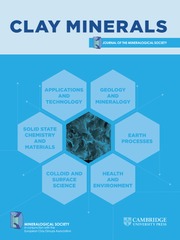Crossref Citations
This article has been cited by the following publications. This list is generated based on data provided by
Crossref.
Ogawa, Makoto
2002.
Photoisomerization of azobenzene in the interlayer space of magadiite.
J. Mater. Chem.,
Vol. 12,
Issue. 11,
p.
3304.
Mizukami, Naoko
Tsujimura, Masashi
Kuroda, Kazuyuki
and
Ogawa, Makoto
2002.
Preparation and Characterization of Eu-Magadiite Intercalation Compounds.
Clays and Clay Minerals,
Vol. 50,
Issue. 6,
p.
799.
Ogawa, Makoto
2004.
Handbook of Layered Materials.
Schwieger, Wilhelm
and
Lagaly, Gerhard
2004.
Handbook of Layered Materials.
Okada, Tomohiko
Watanabea, Yusuke
and
Ogawa, Makoto
2004.
Photocontrol of the adsorption behavior of phenol for an azobenzene-montmorillonite intercalation compound.
Chem. Commun.,
p.
320.
Okada, Tomohiko
Watanabe, Yusuke
and
Ogawa, Makoto
2005.
Photoregulation of the intercalation behavior of phenol for azobenzene–clay intercalation compounds.
J. Mater. Chem.,
Vol. 15,
Issue. 9,
p.
987.
Okada, Tomohiko
Sakai, Hideki
and
Ogawa, Makoto
2008.
The effect of the molecular structure of a cationic azo dye on the photoinduced intercalation of phenol in a montmorillonite.
Applied Clay Science,
Vol. 40,
Issue. 1-4,
p.
187.
Ogawa, Makoto
and
Iwata, Daisuke
2010.
Arrangements of Interlayer Quaternary Ammonium Ions in a Layered Silicate, Octosilicate.
Crystal Growth & Design,
Vol. 10,
Issue. 5,
p.
2068.
Nabetani, Yu
Takamura, Hazuki
Hayasaka, Yuika
Sasamoto, Shin
Tanamura, Yoshihiko
Shimada, Tetsuya
Masui, Dai
Takagi, Shinsuke
Tachibana, Hiroshi
Tong, Zhiwei
and
Inoue, Haruo
2013.
An artificial muscle model unit based on inorganic nanosheet sliding by photochemical reaction.
Nanoscale,
Vol. 5,
Issue. 8,
p.
3182.
Ogawa, Makoto
Sohmiya, Minoru
Kakegawa, Norishige
and
Okada, Tomohiko
2014.
Materials and Clay Minerals.
p.
1.
Ogawa, Makoto
Saito, Kanji
and
Sohmiya, Minoru
2014.
A controlled spatial distribution of functional units in the two dimensional nanospace of layered silicates and titanates.
Dalton Trans.,
Vol. 43,
Issue. 27,
p.
10340.
Abellán, Gonzalo
Coronado, Eugenio
Martí‐Gastaldo, Carlos
Ribera, Antonio
Jordá, Jose Luis
and
García, Hermenegildo
2014.
Photo‐Switching in a Hybrid Material Made of Magnetic Layered Double Hydroxides Intercalated with Azobenzene Molecules.
Advanced Materials,
Vol. 26,
Issue. 24,
p.
4156.
Okada, Tomohiko
Sohmiya, Minoru
and
Ogawa, Makoto
2015.
Photofunctional Layered Materials.
Vol. 166,
Issue. ,
p.
177.
Neumann, Miguel G.
Schmitt, Carla C.
and
Gessner, Fergus
2015.
Encyclopedia of Surface and Colloid Science, Third Edition.
p.
1128.
Kooli, Fethi
Plevert, Jacques
Liu, Yan
Hbaieb, Kais
and
Al-Faze, Rawan
2016.
Conversion of protonic magadiite to PLS-1 zeolite: thermal stability and acidity.
Clay Minerals,
Vol. 51,
Issue. 5,
p.
781.
Okada, Tomohiko
Nozaki, Nozomi
Seo, Jangwon
Kwon, Ji Eon
Park, Soo Young
Hashizume, Hideo
Sasaki, Takayoshi
and
Ogawa, Makoto
2017.
Photoinduced structural changes of cationic azo dyes confined in a two dimensional nanospace by two different mechanisms.
RSC Advances,
Vol. 7,
Issue. 13,
p.
8077.
Okada, Tomohiko
and
Ogawa, Makoto
2017.
Inorganic Nanosheets and Nanosheet-Based Materials.
p.
163.
Bujdák, Juraj
2017.
Inorganic Nanosheets and Nanosheet-Based Materials.
p.
419.
Mokhtar, Adel
Djelad, Amal
Boudia, Abdelkader
Sassi, Mohamed
and
Bengueddach, Abdelkader
2017.
Preparation and characterization of layered silicate magadiite intercalated by Cu2+ and Zn2+ for antibacterial behavior.
Journal of Porous Materials,
Vol. 24,
Issue. 6,
p.
1627.
Okada, Tomohiko
and
Ogawa, Makoto
2017.
Inorganic Nanosheets and Nanosheet-Based Materials.
p.
263.


